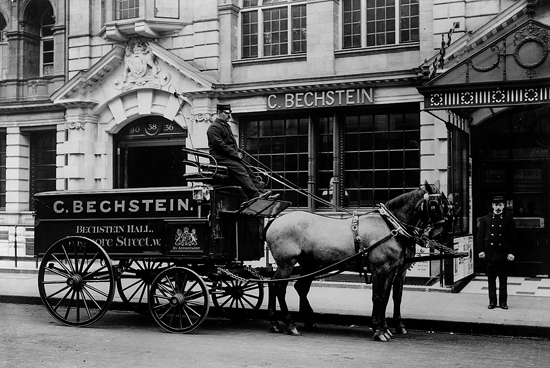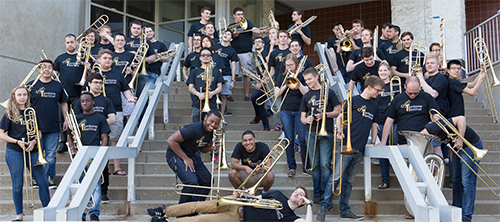by Daniel Hathaway
SATURDAY: At 1 pm, Cleveland Orchestra trombonist Shachar Israel revives his week-long Cleveland Trombone Seminar with a solo recital in CSU’s Drinko Recital Hall (pictured: participants in 2016), and at 4 pm, CelloBello presents Astrid Schween & the Verona Quartet at Cleveland Violins. Saturday evening at 7, the third of four SheScores concerts featuring female and non-binary composers takes place in Mixon Hall at CIM, and at 8 pm, Cleveland POPS orchestra salutes the US Armed Forces at Severance Music Center.
SUNDAY: Afternoon performances at 3 pm include Heights Arts Close Encounters with oboist Frank Rosenwein and the Omni Quartet at Barrie Carriage House & the Euclid Symphony at Shore Cultural Center. At 3:30, Western Reserve Chorale sings songs of America at Church of the Saviour. 4 pm performances bring guitarist Nacho González Nappa & flutist Shea del Bosque to Akron’s Holy Trinity Lutheran Church for original arrangements of tango, Brazilian and Cuban music, and Local 4 Music Fund concludes its four-concert SheScores run at CIM’s Mixon Hall.
NEWS BRIEFS:
Beginning in June, the Cleveland Museum of Art will collaborate with Ideastream Public Media to present a new series, Third Thursdays, at Transformer Station. Hosted and curated by Ideastream personalities, the 7 pm events will offer a mix of live local music and conversation. The June 20 event, emceed by Amanda Rabinowitz, will spotlight the band Talons.’ On July 18, Bill O’Connell will introduce Opus 216, and on August 15, Dan Polletta will welcome the Aidan Plank Ensemble. Performances are free, but tickets are required. Read a press release here.
WEEKEND ALMANAC:
June 1:
Two future piano makers entered the world on June 1: Ignaz Joseph Pleyel in 1757 near Vienna, and Carl F.W. Bechstein in Gotha in 1826.
Pleyel, a student of Haydn, was active in the French cathedral town of Strasbourg until the Revolution, when he fled to London, returning to Paris after The Terror to establish Pleyel et Cie in 1807. The firm began building instruments with metal frames, and introduced the “cottage” or upright piano in 1815, and the double piano in 1890. Pleyel also supplied Albert Schweitzer with a “jungle” piano built with tropical wood and an added pedalboard, brought out the first chromatic harp, and contributed to the harpsichord revival with modern instruments built for Wanda Landowska. The company finally stopped producing instruments in 2013.

Watch a video made by pianist Pierre-Laurent Aimard in the Wigmore Hall on March, 2017 on a recently restored 1899 Bechstein instrument. He chose to play works by composers who had direct connections to Bechstein — Liszt, Scriabin, Debussy, Julian Anderson and Nikolay Obdukhov.
June 2 — by Jarrett Hoffman:
The headliner for June 2 is Edward Elgar, who was born on this date in 1857 in Lower Broadheath, England, outside of Worcester. Among classical musicians, two of his most famous works are the orchestral Enigma Variations (heard here in a 1957 live recording by William Steinberg and The Cleveland Orchestra) and and the oratorio The Dream of Gerontius. And around this time of year, college graduates and families tend to get the trio from his Pomp and Circumstance March No. 1 lodged deep into their brains. (Another opportunity for that: hear Cleveland Orchestra principal trumpet Michael Sachs play the famous tune all by his lonesome in a congratulatory message from May 2020).
But on the performing side, did you know that Elgar, in addition to being an excellent violinist, played the bassoon? Perhaps that was part of his inspiration behind the Op. 62 Romance — the other part being the playing of Edwin F. James, who was then the principal bassoon of the London Symphony, and who premiered the work in 1911 with Elgar on the podium.
Here are two recordings of this short, lyrical, and poetic work. One as written, for you to savor the beautiful orchestration (in a performance by bassoonist Klaus Thunemann and the Academy of St. Martin in the Fields, led by Sir Neville Marriner). Another replaces the ensemble with an organ (another instrument in Elgar’s performing arsenal), providing a totally different and more intimate color (played here by bassoonist Sophie Dervaux and organist Wolfgang Kogert).




